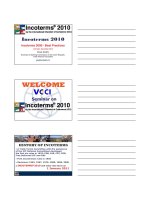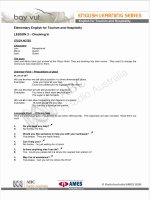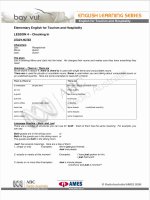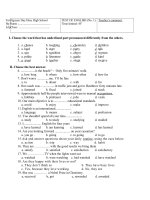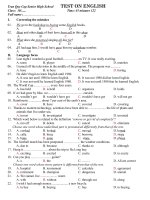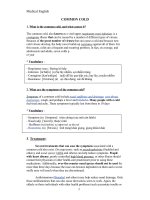ENGLISH 10-PART 1(CKCC)
Bạn đang xem bản rút gọn của tài liệu. Xem và tải ngay bản đầy đủ của tài liệu tại đây (926.74 KB, 50 trang )
B¶n
quyÒn
thuéc
Nhµ
xuÊt
b¶n
Gi¸o
dôc
−
Bé
Gi¸o
dôc
vµ
§µo
t◊o
51-2006/CXB/20-30/GD
M·
sè:
CH020M6
3
TIếNG
ANH 10
đợc
biên son dựa theo
chơng
trnh chuẩn tiếng Anh Trung học phổ thông của
Bộ
Giáo
dục
và
Đào to, tiếp theo Tiếng Anh 6,
Tiếng Anh 7, Tiếng Anh 8
và
Tiếng Anh 9.
TIếNG ANH
10
đợc biên
son dựa theo chủ điểm
(theme-based)
gồm 16
đơn v bài
học
và
6
bài ôn.
Mỗi
đơn v
bài
học ứng với một chủ
đề
cụ thể
và
gồm
các
mục sau:
A.
Reading:
Gồm một hoặc một số
đon văn
có
độ dài
khoảng
180
220 từ,
nhằm
giúp học sinh
làm
quen với chủ
đề
của
đơn v
bài
học, cung cấp
thông
tin
và
ngữ
liệu cho
toàn đơn v bài
học
và phát
triển
các kĩ năng
đọc
hiểu cho
các
em.
B.
Speaking:
Gồm
các
hot
động
luyện
kĩ năng
nói theo
các
chức
năng ngôn
ngữ
và
theo chủ
đề
của
đơn v bài
học, đợc
trnh bày
qua
các
hot
động
giao
tiếp nh thực
hành
nói theo cặp,
thảo
luận theo
nhóm
và
nói
cá
nhân.
C.
Listening:
Gồm
các đon
văn hay
các đon
thoi
liên
quan
đến
chủ
đề
của
đơn v bài
học. Mục
đch chnh là
nhằm
rèn luyện
kĩ
năng nghe hiểu cho
học sinh.
Ngoài
ra, Listening còn giúp củng cố
và
chỉnh
sửa li những sai lệch về
cách
phát
âm và
sử
dụng
các
cấu trúc
ngôn
ngữ của học sinh.
4
D.
Writing:
Gồm
các bài
tập
phát
triển
kĩ năng
viết của
học
sinh theo
các
thể loi
văn bản khác
nhau nh viết th,
mô tả
dữ liệu, trần thuật, v.v
5
E.
Language Focus:
Gồm hai mục chnh,
Pronunciation
và
Grammar and vocabulary. Pronunciation
nhằm
ôn
li cách phát
âm
những âm
đơn và
âm
đôi
(nguyên âm hay phụ âm) trong từ
và
trong
các phát ngôn.
Grammar and vocabulary
đề
cập
đến
những vấn
đề
ngữ
pháp và
từ vựng
đợc
cho
là
trọng tâm của
đơn v bài
học.
Những
vấn
đề này
đợc trnh bày
dới
hnh
thức
bài
tập hay hot
động
giao tiếp
để
học
sinh thực hành.
Sáu bài ôn
tập
đợc trnh bày
dới
hnh
thức
Test Yourself
và
đợc
thực hiện sau mỗi chủ
đề
lớn
đợc
quy
đnh
trong
chơng
trnh chuẩn của Bộ
Giáo
dục
và Đào
to.
Các
Test
Yourself
đợc
biên son
để
giúp học sinh tự kiểm tra
khả
năng và
sự hiểu biết của
mnh
sau khi
các
em
đã
học xong từ
hai
đến
ba
đơn v bài
học
(nghĩa là,
sau từ 10
đến
15 tiết
học)
và
giúp
giáo
viên có
cơ
sở tham
khảo để
thiết kế
bài
kiểm tra 1 tiết cho học sinh. Điểm số của mỗi phần trong
một
Test
Yourself
đợc tnh trên
tổng số 10
điểm
nh
sau:
Listening : 2,5
điểm
Reading : 2,5
điểm
Writing : 2,5
điểm
Language Focus :
2,5
điểm
Cuối
sách là
danh mục từ vựng
đợc
liệt kê theo từng
đơn v
bài
học
có
phiên âm và nghĩa
tiếng Việt
tơng
đơng.
Tập thể
các tác giả
hi vọng
TIếNG ANH
10 sẽ mang li nhiều
bổ
ch
cho
các
em học sinh. Chúc
các
em
thành
công!
CáC
táC Giả
6
Buckingham
Palace
An overview of London
B O O K M A
P
●
B O O K M A
P
●
B O O K M A
P
●
B O O K M A
P
7
Reading Speaking
Unit 1
A DAY IN THE
LIFE OF
Page 12
● Guessing meaning in
context
● Passage comprehension
● Scanning for specific
information
● Asking for and giving
information from a
timetable
● Talking about daily
activities
Unit 2
SCHOOL
T
ALKS
Page 22
● Reading for exact
information
● Passage comprehension
● Making questions and
giving responses in
small talks
Unit 3
PEOPLE’S
BA
CKGR
OUND
Page 32
● Vocabulary comprehension:
matching
● Deciding on True or False
statements
● Passage comprehension
● Asking and answering
questions about
people’s background
● Role-playing
Unit 4
SPECIAL
EDUC
ATION
Page 44
● Vocabulary comprehension:
matching
● Extensive reading:
multiple-choice questions
● Intensive reading: gap-fill
● Making an interview:
matching
● Making an interview and
reporting on results
Unit 5
TECHNOL
OG
Y
AND
Y
O
U
Page 54
● Vocabulary comprehension:
matching
● Identifying the main idea
● Passage comprehension
● Asking for and giving
information about the uses
of modern inventions
● Talking about the uses of
modern technology
Unit 6
AN EX
CURSION
Page 62
● Extensive reading:
multiple-choice questions
● Passage comprehension
● Intensive reading: gap-fill
● Expressing agreements and
disagreements
● Giving opinions
7
B
O
O
K
M
A
P
●
B
O
O
K
M
A
P
●
B
O
O
K
M
A
P
●
B
O
O
K
M
A
P
Listening W
riting
Language
Focus
● Monologue:
−
Listening and numbering
pictures
−
Deciding on True or
False statements
● Writing a narrative
−
Narrative and the
past simple
−
Stages of a
narrative
● Pronunciation:
/
I
/ − /
iù
/
● Grammar and vocabulary:
−
The present simple
−
Adverbs of frequency
−
The past simple
● Dialogue:
−
Listening to small talks
and numbering pictures
−
Completing a dialogue
● Filling in a form ● Pronunciation:
/
Ã
/ − / aù /
● Grammar:
−
Wh-questions
−
Gerund and to + infinitive
● Dialogue:
−
Deciding on True or
False statements
−
Gap-filling
● Writing about
people’s
background
● Pronunciation:
/
e
/ − /
Q
/
● Grammar:
−
The past perfect
−
The past perfect vs.
the past simple
● Monologue:
−
Deciding on True or
False statements
−
Gap-filling
● Writing a letter
of complaint
● Pronunciation:
/ ∞ / − / ≤ù /
● Grammar and vocabulary:
−
The + adjective
−
Used to + infinitive
−
Which
as a connector
● Monologue:
−
Deciding on True or
False statements
−
Gap-filling
● Writing a set of
instructions
−
Sequence
connectors
−
Imperative verb
form
● Pronunciation:
/
U
/ − / uù /
● Grammar and vocabulary:
−
The present perfect
−
The present perfect passive
−
Who,
which,
that
● Monologue:
−
Listening and numbering
pictures
−
Gap-filling
−
Comprehension questions
● Writing a
confirmation
letter
● Pronunciation:
/ « / − /
Îù
/
● Grammar:
−
The present progressive
(with a future meaning)
−
Be going to
B O O K M A
P
●
B O O K M A
P
●
B O O K M A
P
●
B O O K M A
P
8
Reading Speaking
Unit 7
THE MASS
MEDIA
Page 74
● Vocabulary comprehension:
matching
● Deciding on True or False
statements
● Passage comprehension
● Asking and answering
questions about uses of
media
● Talking about different
types of media
Unit 8
THE STORY OF
MY
VILL
A
GE
Page 82
● Vocabulary comprehension:
matching
● Scanning for specific
information
● Passage comprehension
● Talking about plans and
their possible results
(in the village)
Unit 9
UNDERSEA
W
ORLD
Page 94
● Vocabulary comprehension:
gap-fill
● Passage comprehension
● Cloze reading: gap-fill
● Talking about causes and
consequences
● Offering solutions
● Reporting on discussion
results
Unit 10
CONSER
VATION
Page 104
● Vocabulary comprehension:
matching
● Deciding on True or False
statements
● Identifying the main idea
● Talking about the new
kind of zoos
● Reporting on discussion
results
Unit 11
NATION
AL
PARKS
Page 112
● Finding words from
context
● Passage comprehension
● Making plans
● Expressing regrets
● Talking about an excursion
B
O
O
K
M
A
P
●
B
O
O
K
M
A
P
●
B
O
O
K
M
A
P
●
B
O
O
K
M
A
P
9
Listening W
riting
Language
Focus
● Monologue:
−
Listening to radio news
−
Gap-filling
● Writing about
advantages and
disadvantages
of the mass
media
● Pronunciation:
/
eI
/ − /
aI
/ − /
≤I
/
● Grammar:
−
The present perfect
−
Because of and in spite of
● Monologue:
−
Deciding on True or
False statements
−
Gap-filling
● Writing an
informal letter:
giving directions
● Pronunciation:
/ aU / − / «U /
● Grammar:
−
Reported speech: statements
−
Conditional sentence type 1
● Monologue:
−
Deciding on True or
False statements
−
Comprehension questions
● Describing
information
from a table
● Pronunciation:
/
i«
/ − / e« / − / U« /
● Grammar:
−
Should
−
Conditional sentence type 2
● Monologue:
−
Sequencing events
−
Deciding on True or
False statements
−
Identifying specific
information
● Writing a letter
of invitation
● Pronunciation:
/ b / − / p /
● Grammar:
−
The passive voice
● Monologue:
−
Gap-filling
−
Comprehension questions
● Writing a letter
of acceptance or
refusal
● Pronunciation:
/ d / − /
t
/
● Grammar:
−
Conditional sentence type 3
B O O K M A
P
●
B O O K M A
P
●
B O O K M A
P
●
B O O K M A
P
1
0
Reading Speaking
Unit 12
MUSIC
Page 124
● Vocabulary comprehension:
gap-fill
● Passage comprehension
● Asking and answering
questions about music
● Talking about favourite
kinds of music
Unit 13
FILMS AND
CINEMA
Page 132
● Finding words from
context
● Passage comprehension
● Identifying the main idea
● Expressing attitudes
● Expressing preferences
● Talking about a film
Unit 14
THE
W
ORLD
CUP
Page 142
● Vocabulary comprehension:
matching
● Scanning for specific
information: gap-fill
● Deciding on True or False
statements
● Asking and answering
questions about the
World Cups
● Talking about the World
Cup winners
Unit 15
CITIES
Page 156
● Understanding new words/
expressions in context
● Deciding on True or False
statements
● Passage comprehension
● Comparing two cities
● Stating preferences and
giving reasons
Unit 16
HIS
T
ORICAL
PL
A
CES
Page 166
● Understanding new words/
expressions in context
● Deciding on True or False
statements
● Asking and answering
questions about a
historical place
● Talking about historical
places from given
information
B
O
O
K
M
A
P
●
B
O
O
K
M
A
P
●
B
O
O
K
M
A
P
●
B
O
O
K
M
A
P
11
Listening W
riting
Language
Focus
● Dialogue:
−
Deciding on True or
False statements
−
Comprehension questions
● Writing a profile ● Pronunciation:
/
s
/ − /
z
/
● Grammar:
−
to + infinitive to talk about
purposes
−
Wh- questions
● Dialogue:
−
Listening for the main
idea
−
Filling in the table
● Describing a film ● Pronunciation:
/
f
/ − / v /
● Grammar and vocabulary:
−
Attitudinal adjectives
−
It is/was not until that
−
a/an and the
● Monologue:
−
Filling in the table
−
Comprehension questions
● Writing an
announcement
● Pronunciation:
/ g / − / k /
● Grammar:
−
Will vs. going to
−
Will: making predictions
−
Will: making offers
● Monologue:
−
Listening for specific
information
−
Filling in a table
● Describing a city ● Pronunciation:
/ T / − /
D
/
● Grammar and vocabulary:
−
Non-defining vs. defining
relative clauses
−
Although as a contrasting
connector
● Monologue:
−
Listening for specific
information:
multiple-choice questions
−
Comprehension questions
● Describing a
chart
● Pronunciation:
/ Z / − / S /
● Grammar and vocabulary:
−
Comparatives and superlatives
−
Making comparisons
1
2
Unit
1
A DAY IN THE LIFE
O
F
A.
READING
Before you
r
ead
Work in pairs. Ask and answer questions about your daily routine,
using the cues below.
Example: what time you often get up
A: What time do you often get
up?
B: I often get up at six.
−
what time you go to school / have breakfast / lunch / dinner / go to
bed
−
what you often do in the morning / afternoon / evening
While you
r
ead
Read the passage and then do the tasks that follow.
Mr.
Vy: The alarm goes off at 4:30. I get up and go down to the
kitchen to boil some water for my morning tea. I drink several cups of
tea, have a quick breakfast and then lead the buffalo to the field. It
takes me
45 minutes to get ready. I leave the house at a quarter past five and
arrive in the field at exactly 5:30. I plough and harrow my plot of land
and at a quarter to eight I take a short rest. During my break I often
drink tea with my fellow peasants and smoke local tobacco. I continue
to work from a quarter past eight till 10:30. Then I go home, take a
short rest and have lunch with my family at 11:30. After lunch I
usually take an hour's rest.
Mrs. Tuyet: At 2:30 in the afternoon we go to the field again.
We repair the banks of our plot of land. Then my husband pumps water
into it while I do the transplanting. We work for about two hours
before we take a rest. We finish our work at 6 p.m. We have dinner
at about
7 p.m., then we watch TV and go to bed at about 10 p.m. Sometimes
we go and see our neighbours for a cup of tea. We chat about our
work, our children and our plans for the next crop. Although it’s a
long day for us, we are contented with what we do. We love working
and we love our children.
Task 1. Choose the option A, B, or C that best suits the meaning of
the italicised word(s).
1. The alarm goes off at 4:30.
A. goes wrong B. goes away C. rings
2. It takes me 45 minutes to get
r
eady.
A. to go B. to wake up C. to prepare
3. We chat about our work.
A. talk in a friendly way B. learn C. discuss
4. We are contented with what we do.
A. satisfied with B. disappointed with C. interested in
14
Task 2. Answer the following questions.
1. What is Mr. Vy’s
occupation?
2. What time does he get up and what does he do after that?
3. What does he do in the morning?
4. What do Mr. Vy and his wife do in the
afternoon?
5. Are they happy with their lives or not? Why?
Task 3. Scan the passage and make a brief note about Mr. Vy
and
Mrs. Tuyet’s daily routines. Then compare your note with a
partner.
After you
r
ead
Work in groups. Talk about Mr. Vy and Mrs. Tuyet’s daily
routines.
B. SPEAKING
Task 1. Quan is a tenth-grade student. He goes to school every
morning. Below is his weekly timetable. Ask and answer questions
with a partner, using the information from the timetable.
Examples:
A: What time does Quan have a Civic Education lesson on Monday?
15
B: (He has a Civic Education lesson) at 7:15 a.m.
A: What lesson does Quan have at 7:15 a.m. on Monday?
B: (At 7:15 on Monday he has) a Civic Education lesson.
16
Monday
T
uesday Wednesday
Thursday Friday
Saturday
7:15
Civic
Education
Physics
Physical
Education
English Maths Literature
8:05
Information
Technology
Literature Literature Geography
Information
Technology
English
8:55 Maths Biology Literature History English Maths
9:55 Maths Chemistry Physics
Physical
Education
Physics Maths
10:40 Chemistry
Class
Meeting
Task 2. Talk about Quan’s activities, using the pictures below.
14:00 14:15 16:30
a b c
17:00 17:15 18:30
d e f
18:45 19:00 20:00
g h i
Task 3. Tell your classmates about your daily routine.
17
C. LISTENING
Before you
listen
Work in pairs. Ask and answer the following questions.
−
Have you ever travelled by cyclo?
−
When was it?
−
Is it interesting to travel by cyclo?
−
Which do you prefer, going by bicycle or by cyclo? Give reason(s)?
●
Listen and repeat.
district routine office pedal purchases
drop passengers ride park food stall
While you
listen
Task 1. You will hear Mr. Lam, a cyclo driver, talk about his
morning activities. Listen to his talk and number the pictures in their
correct order.
a b c
d e f
18
Task 2. Listen again. Decide whether the statements are true (T) or
false (F).
T
F
1. Mr. Lam lives in District 1.
2. Mr. Lam usually gets up early.
3. After Mr. Lam gets up, he rides his cyclo
from District 5 to District 1.
4. Mr. Lam’s first passengers are two pupils.
5. Mr. Lam has lunch at home with his family.
6. After lunch Mr. Lam immediately goes back to work.
After you
listen
Work
in pairs. Take turns to ask and answer questions about Mr.
Lam’s activities, using the cues below. Then retell his story to the
class.
name start work lunch
occupation passengers rest
D.
WRITING
Task 1. Read the following passage and find all the verbs that are
used in the past simple and the connectors (time expressions) in the
story.
A
narrative
14
th
July 1995 is a day I shall never forget. On that day, I stared
death
in the face.
Our flight was due to leave at 11 a.m., and I arrived at the airport
quite early. We got on the plane at 10:30 and the plane took off on
time. The air-hostesses were just beginning to serve our lunch when the
19
plane
began to shake.
20
At
first, we thought we were
flying
in bad weather.
We
were told to
stay seated and fasten our seat belts. Then suddenly the plane
seemed to dip.
We
realized we were in danger. Many people screamed
in
panic.
We all thought we had only minutes to live.
Then, just when we
had
given up all hope, we felt
the plane slowly
gained
height.
A few
minutes
later
the pilot announced
that
everything was all
right.
We were all overjoyed
and
relieved. One hour
later
we landed safely. It was
the most frightening
experience of my life.
Task 2. Work in groups. Identify the events, the climax, and the
conclusion of the story. Then report your results.
Task 3. Use the prompts below to build up a narrative about a hotel
fire. Last year / I / spend / summer holidays / a seaside town. / The
hotel /
be modern / comfortable. / I / have / wonderful holiday / until / fire.
It / be / Saturday evening / and / everybody / be / the discotheque /
ground floor. / It / be / crowded / with people. / They / dance /and / sing
happily. / Suddenly / we / smell / smoke. / Then / black smoke / begin /
fill / room. / Everybody / start / scream / in panic. / People / run toward
/ fire exits. / One door / be / block. / Many people / begin / cough /
choke.
Then / just as we / think / we / have / only / minutes / live, / fire
brigade / arrive. / Firemen / fight / their way / into / room / and soon /
everyone / be / safely out of the building. / Luckily / nobody / be /
seriously hurt. / It / be / most frightening experience / my life.
21
E. LANGUAGE F
OCUS
●
Pronunciation:
/
I
/
−
/
iù
/
●
Grammar
and
vocabulary:
1. The present
simple
2. Adverbs of
fr
equency
3. The past
simple
● Listen and repeat.
/
I
/ /
iù
/
hit kick heat repeat
bit click beat read
little interest meat eaten
● Practise these sentences.
1. Is he coming to the cinema?
2. We’ll miss the beginning of the film.
3. Is it an interesting film, Jim?
4. The beans and the meat were quite cheap.
5. He’s going to leave here for the Green Mountains.
6. Would you like to have meat, peas and cheese?
Grammar
and
vocabulary
Exercise 1. Complete the blanks in the passage. Use the correct
present simple form of the verbs in the box. (There are more verbs
than needed and you will have to use some verbs more than once.)
be play take run
fish go say catch
worry give up like realise
22
Fishing (1)
my favourite sport. I often (2) for
hours without catching anything. But this does not (3) me.
Some fishermen (4) unlucky. Instead of catching fish, they
(5) old boots and rubbish. I (6) even less lucky.
I never (7)
anything − not even old boots. After having
spent whole mornings on the river, I always (8) home with
an empty bag. "You must (9)
fishing!", my friends
(10) "It’s a waste of time". But they don’t (11)
that I (12)
not really interested in fishing. I’m only
interested in sitting in a boat, doing nothing at all.
Exercise 2. Put each of these adverbs of frequency in its appropriate
place in the sentences below.
always usually sometimes as a rule
never often normally occasionally
He gets up
early
.
She is late for school.
Lan practises speaking English.
Thao is a hard-working student.
Exercise 3. Supply the correct past simple form of the verbs in
brackets.
Late in the afternoon, the boys put up their tents in the middle of a
field. As soon as this (1) (do), they (2) (cook) a
meal over an open fire. They (3)
(be) all hungry and the food
(4) ________ (smell) good. After a wonderful meal, they
(5) (tell) stories and (6) (sing) songs by the camp
fire. But some time later it (7)
(begin) to rain. The boys
(8)
(feel) tired so they (9) (put out) the fire and
(10 (creep) into their tent. Their sleeping-bags were warm
and comfortable, so they all (11) (sleep) soundly. In the middle
of the night two boys (12) (wake) up and began shouting.
The tent (13)
(be) full of water. They all (14)
(leap) out of their sleeping-bags and (15) (hurry) outside.
It was raining heavily and they (16) (find) that a stream had
formed in the field. The stream (17) (wind) its way across
the field and then (18) (flow) right under their tent!
